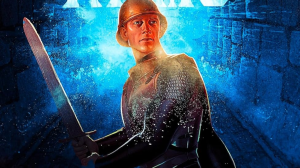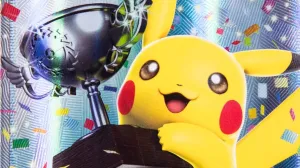My Hero Academia is one of the most influential anime series of all time, and it is hardly finished. This year, the fandom gathered to watch the anime return to the screen with season seven, and My Hero Academia did not hold back. From episode one, the new season has stood apart as one of the anime’s best. Now, My Hero Academia is facing its second finale for season seven courtesy of the dub. Crunchyroll has kept fans buzzing with the English dub, and recently, ComicBook got the chance to speak with several of the stars behind My Hero Academia ahead of the close.
Videos by ComicBook.com
Below, you can find our interview with Justin Briner (Izuku Midoriya), Clifford Chapin (Katsuki Bakugo), and Eric Vale (Shigaraki). The three voice actors took time to reflect on their journey with My Hero Academia from start to the present. So if you want to see how the actors tapped into their key roles, read on below:
Q: Justin, I wanna know: what do you remember being your first impression of My Hero Academia? Did you have any inkling about what was to come?
Justin Briner: Yeah, when we were first getting started with the idea of dubbing [the anime] and localizing it for our audience, there was already sort of a buzz around it. You know, that there is something special. There was some sort of spark of something about this property that’s really exciting.
When I was asked to audition for it, I read some of the manga that was out and there were a couple of the episodes that were out. It did feel like there was some kind of unknown quantity that really made this show pop. I really wanted to be a part of it.
You know, you could feel that sort of electricity from just the first two episodes. They were some really special moments between Deku and Bakugo and All Might in those early episodes that set the stage for what has become such an amazing story so far. Back in the beginning, I felt nervous but excited.

Q: Looking back at season one, Clifford, I wanted to ask why you feel it managed to hook so many fans? What do you feel like season one had that made it so special so quikcly?
Clifford Chapin: Oh, wow. For season one in particular, it struck at a really good moment in what I would say was American pop culture because we were seeing throughout the entertainment industry a rise of superhero media.
We were all kind of primed for it thanks to a whole bunch of movies that happened to be coming out pretty regularly during that time. I think what My Hero Academia that those movies did do in some cases and didn’t do in other cases was get down to the nitty-gritty of characters. You know, you met Deku and you understood Deku, and you met Bakugo and you understood who he was and that there were layers to all these characters. Then Todoroki and all the others were brought in one by one.
There was something beneath the surface of all those characters. One of the beautiful things that anime does in particular is it tries to tell those stories and delves into those characters while developing them. I think especially once season one was completed and people were able to consume it all, it engrossed people with the characters because there was always a character that the audience could find themselves in.
Q: I love that answer. We have the students we love. We have the heroes and the pros. And then we have Shigaraki who in season one is so manic. The scratching, the raspiness that we get in your performance, Eric, it’s incredible looking back at season one and then tracking his progress. Looking back, what do you recall about the character that really sticks out to you?
Eric Vale: I wouldn’t say that I saw the trajectory because I’ve been surprised at where we’ve gone through the story.
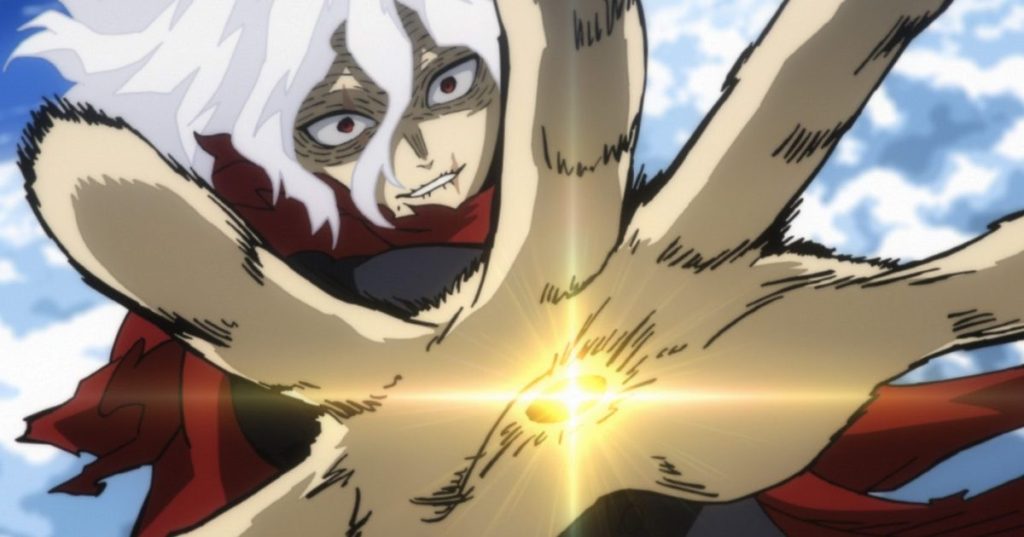
I did see the villain, and I didn’t see him as anything other than that. You know, most everybody has been to high school. [That place] does breed contempt because of the classism and whatnot that happens in the classroom. So you see this guy who becomes totally disillusioned by all of that. That’s the reality of a young teenager who’s watching the world around him move faster than his brain can process.
He just gets angry. I don’t think he was there in season one, so that’s what I tried to play.
Q: Clifford, looking at the main cast of My Hero Academia, all of them go through such incredible character growth. So when you look back, what comes to mind when you think about Bakugo? How do you read the early version of the hero?
Chapin: It’s a lot. There’s a lot.There’s a lot to think about on that. I would say, first of all, one of the beautiful things about a character like Bakugo is you kind of know going into the beginning of the series that the purpose of a character like that is to grow and be humbled. Eventually, the rival has to come to terms with the central character which in this case is Deku.
I kinda remember thinking in early episodes, they leaned into making Bakugo as unlikable as you could make a 14-year-old kid because you need to give that character somewhere to grow. I just always tried to lean into that abrasive attitude,
When I was playing him, I knew I was eventually going to have to move past this. Colleen Clinkenbeard was the voice director for the first six seasons, and she was always really good about pushing me to be even angrier about stuff. There would be certain times where I would feel we should mix it up a little bit. And she was like, no, stay angry. I would just follow that note until we had what I’ve felt is incredible payoff
Q: We’ve talked a lot about season one, and from that season on, it never looked back. The series just exploded. Clifford, looking through seasons two through six, are there any moments really kind of in those moments stands out to you for your character?
Chapin: I feel like Bakugo is very fortunate in that all of his moments are incredible story beats and worth talking about. Like the sports festival fight is one of my favorite moments, you know, because he wins it but he’s not content with the win. It’s not about winning. It’s about proving that he’s the best. I thought that was like a really amazing moment.
Also, Bakugo getting kidnapped and rescued. The rescue episode is still one of my favorites from season three. The second movie is still like my favorite. That was such a great movie, and then looking all the way to season six – that is the season where I felt like the entirety of the Class 1A got to give some of their best performances to date. Now, we have season seven where some pretty serious things have happened to Bakugo to put it as lightly as possible.
Being able to experience all these things? I always say that as an actor, it’s kind of a dream come true. All of us are storytellers and we love getting to perform and nothing is really more gratifying from that perspective than playing a character who really gets to grow and change and be something more than they were in the beginning.
Q: Justin, I’m sure this question is difficult for you because Deku is there at every major beat of the series, but what moments stand out to you for the character?
Briner: It’s funny because there are many, many moments that Deku has experienced over the years. Every season it seems like there’s a great scene that I love. I’m like, that’s my new favorite for sure. Nothing’s going to top that next season. Then sure enough, there’s another. I’m like, okay, that’s my new favorite now.
It’s also really special for audiences to have a character like Deku for so long. It’s been eight or so years now that we’ve gotten to root for him and cheer him on during these really rough encounters We have watched him grow up kind of before our eyes and as we grow up together. I think that’s really special. It’s kind of rare in what we get to do to stick with a character for so long like this.
It’s just really special. Yeah. And I’m always excited for what he’s going to get up to next.
Q: Eric, with you and Shigaraki, are there any moments that stick out to you?
Vale: My favorite moment is towards the end of season five where he makes his vocal shift and gets rid of his childish voice. He becomes a man so to speak.
That was interesting because we had a lot of fan responses online. For months and months before we started recording that, there were people online wondering about the vocal change and how it was going to happen. A lot of people asked me if I was going to screw it up, and I didn’t know what they were talking about. I went to Colleen and asked do I have to be changing the voice? We both had to dive into some research and then realized that it’s a big character shift for Shigaraki in a lot of different ways. I wouldn’t say a different character, but he changes his face a little bit, literally and figuratively.
Q: We’re here to talk a lot about the legacy of My Hero Academia, and these days, we’re dealing with the season seven dub. But since the start, since episode one went live, Deku’s relationship with All Might has been a key focus of what a legacy is in My Hero Academia. I wanted to ask what do you feel that bond has meant to Deku as he has grown through season one to season seven?
Briner: All Might has quintessentially made Deku the person he is today. At first, Deku idolized All Might. He was a hero to him, truly, but Deku didn’t know All Might. He knew what All Might was about. He knew his ethics and what he stood for, but he didn’t know All Might as a person. Then Deku gets to meet his hero.
It turns out he is a deeply good person with a big heart and even a bit misunderstood. All Might is not exactly who he seems to be to the public. So Deku gets to meet his hero that he idolized for so long and then learn he’s not perfect but he’s still the person that Deku has adored all of his life.
Q: We talked a lot about Deku and All Might’s relationship and how that has formed Deku’s character, but there’s also Bakugo. Clifford, I’d like to start this question with you. Bakugo’s bond with Deku has changed considerably to say at the least, so what have you made of that shift?
Chapin: For me, the main focus has always been to remember all of the story beats – to always remember where we’ve been and where we are now with the character. Because every development that Bakugo has gone through in the series, they have been like baby steps, you know? He takes that first little step of acknowledging Deku’s relevance when they do their first battle in season one. And then again in season two, when they have to fight together against All Might, Bakugo is forced to not only acknowledge Deku but treat him as a part of the plan. We have to remember with each step that he’s moving a little bit closer to getting past that initial aggression he had back in season one.
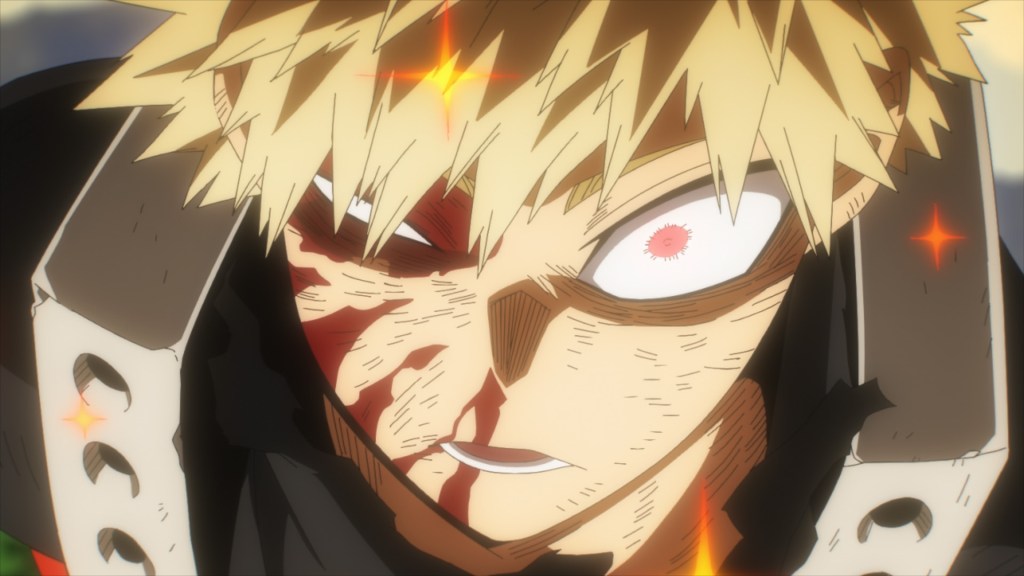
That’s always been sort of the trick with playing Bakugo throughout the series. It’s a lot sometimes because we’d hit a cue or a few lines where we’d have figure out Bakugo is talking about this thing from season three, episode one. We’d have to really parse out what it was we were discussing. It’s been a very strange experience for me only in the fact I have an encyclopedic knowledge of Bakugo’s story beats at this point.
Q: Of course, Justin – Deku has his own side of this story. What do you think about the pair’s bond and why it’s become so integral to Deku’s characterization?
Briner: Yeah, the relationship between Deku and Bakugo is one of the main cornerstones that I feel attracted people to the show in the first place. They have such a complicated history from childhood friends to bully-and-victim to begrudging cohorts and then a duo. What I think is the the frustrating part for both of them is that they know each other better than they know themselves.
There’s no fooling either of them. And so when Deku begins to act a little secretive and sly, instantly Bakugou registers that something is wrong. He wants to know what is wrong? The focal point of their relationship now is about honesty. They can approach each other as honest equals, and they are finally forging the relationship that I feel like we’ve been clamoring. It’s like, please just work together.
Q: Now for Shigaraki’s place in season seven, Eric, what has it been like stepping into this new version of the villain that we’ve watched be built up for years now?
Vale: It’s been kind of a rollercoaster because there’s so much to keep up with his character, especially as we get on into season five on onto season seven.
It’s not as simple as knowing the voice of the character and understanding the motivation and playing it out. It comes down to the peaks and valleys that you have to navigate because he’s got multiple voices inside of him; You’ve got to know what lead voice is in the lead in each moment, then with that performance, I have to match up with John Swayse because he’s voicing All For One .
Those voices are sometimes are played at the same time and sometimes they’re not. So when they’re not together. I’ve got to think whether All For One is leading the charge of this particular piece of dialogue.
It’s on me as an actor to understand how Swayse would perform that moment and whether Shigaraki needs to emulate that a little bit. Is Shigaraki taking over this moment, and then if he is, at what point of his growth is he? Is he angry and post-pubescent? Is he a man? Is he being petty?
Q: We’ve talked a lot about the relationship of Deku and All Might, Deku and Bakugo, but right now, the biggest thing I’m concerned about is Deku and Shigaraki. Eric, I wanted to ask what do you feel about the build up within Deku and Shigaraki’s relationship?
Vale: It seems to me there is the natural progression of good versus evil. In order to battle evil, in some ways, you have to tap into an evilness. It doesn’t seem to work the other way, though. In order to battle good, it’s not like you have to walk an old lady across the street.
Q: And Justin, the same question to you – how has the progression of Deku’s relationship with Shigaraki grown in your opinion?
Briner: I mean, it’s great to see them. Maybe I wouldn’t say great, but it’s very cathartic to see them at odds finally. They’ve been dancing around this encounter, this one that has been coming for all of these seasons up until now. They’ve sparred here and there. They’ve had little conflicts and tactical victories, but now they are really throwing down, so it’s exciting.
These two characters mirror each other in a lot of ways. If certain variables in their pasts had been different, they could be on opposite sides right now fighting each other for completely different causes. I would say a problem both of them share is that they are unwilling to back down, and they’ll sacrifice whatever parts of them they’re able to achieve their goals.
They are really at an impasse right now, and it’s just exciting to see what’s going to happen. What new trick are going to pull out against each other this time?
Q: Now, there is also unmistakable bad blood between Shigaraki and Bakugo. Eric, Shigaraki says that he’s aiming for Bakugo not in respect of his power but because of his relationship with Deku. So what did it feel like for you to be able to see that encounter come to pass?
Vale: I think probably it’s just feels like another move on the chessboard, you know? You know, sometimes you sacrifice pieces in order to get the win, and that’s what it feels. It feels more like a setup, you know what I mean? Like, you put pieces in the right place and then you kill the queen to get to the king.
Q: Clifford, what is your take on these characters and their strenuous tie?
Chapin: It’s funny because I don’t think I really clocked that there was much of a relationship between Shigaraki and Bakugo… at least until the third season when Shigaraki had the League of Villains capture Bakugo because they felt like they would be able to recruit him. That encounter, I feel like is what really set the stage for a lot of this because I always like to think about that moment. The moment where Bakugo goes, no, I’m gonna be a hero.
I feel like that was the real beginning of the relationship because it is what definitively put them at odds. When we get to now, after six seasons of encounters, we are introduced to a coffin in the sky. We Bakugo faced with the ultimate version of his mindset, because Bakugo knew Deku was the trump card in this fight. The plan to win needed to have Deku in this fight, that if there was nothing that could be done, then Bakugo had to do anything he could to win the fight. And it didn’t go great.
But but you know, we’re starting to see that Shigaraki is recognizing that he has been hurt in some way. He did take damage. Bakugo wasn’t just a gnat flying around him. You know, he made Shigaraki change his tactics in the fight. In its own way, that’s still a win for Bakugo.
Q: Clifford, we have to talk about “Light Fades to Rain”. The episode is a culmination of so many things for Bakugo. What was it like for you facing that pivotal episode?
Chapin: I mean, it was obviously a huge moment that I have been aware of for a long time now. I want to say I was actually at a convention, and I was doing a panel with David Matranga, the voice of Shoto Todoroki in the English dub of My Hero Academia, the day of the chapter in the manga came out. The the panel turned to questions from the audience and first question was someone stood up and asked if it was true? The audience was going to turn on this, this poor kid. But it was it was because it was so new.
It’s been one of those things where I’ve been… it sounds weird to say that I’ve been looking forward to it. It’s one of those things where you just know that’s going to be a good acting opportunity. That said, in past examples, such as the big class fight in season six, it felt very easy to get into the emotional space. The session was charged by everybody else being in that emotional space. I had all the other actors in there. Well, maybe not all of them, but most of them. I could play off of their emotions as I was going through.
In “Light Fades to Rain”, there’s basically nothing except for Eric as Shigaraki kicking the crap out of me. Mof the episode is me just reacting and grunting and being in pain. So it took a lot of me to be completely honest. It took a lot of digging deep to strike that emotional chord. But fortunately, I had faith, I had faith in myself that once we got to the point that he was starting to talk to Deku and does that thing where he vows to defeat him. I was like, that’s where I know I’m gonna cry.
I know I’m gonna cry as I say it. That is exactly what happened is I started to cry. I just held on to that emotional feeling for as much of it as I could. And so it was just me trying to hone in on everything that Bakugo had done before.
Q: Justin, I want to ask – as you were kind of preparing for the fallout of “Light Fades to Rain”, how did you get into the mind scape for its intensity?
Briner: It just seems like from the beginning of season seven, the stakes have been at 10 out of 10. It’s not back down, and I feel like Deku is now part of a kind of proud shonen tradition of taking a few too many episodes to get to a battle only to find they’re a second too late. It’s exciting. I don’t think there’s been an encounter so far where Deku has had such emotional heights or has unleashed quite this much power and ability.
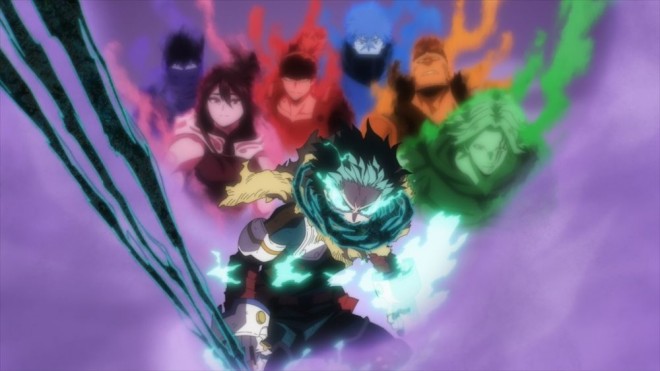
You know, it’s all been leading up to this so far. Combined with the animation and the music, it’s always just a feast for the senses. So I’m just really excited to see it all come together.
Q: My Hero Academia hones in on a lot of themes. And obviously, we’ve said legacies, are one of those top topics in the anime. For the three of you, obviously, you have established your own legacies as part of My Hero Academia. I want to ask you all what does it mean for you to be part of Kohei Horikoshi’s hit series?
Briner: Yeah, being a part of the lineage of My Hero Academia is infinitely more than I ever could have expected. I have loved anime personally from a very young age so to be a part of it at all is very special.
To have started the anime all these years ago and to see where it is now and to have interfaced with so many people, that’s amazing. To be a small part of why that has happened… you can’t ask for more than that, I think. I’m just really, really grateful and honored to have been a part of it with the rest of the cast and crew for as long as we have been. It’s really just a highlight of my career.
Chapin: It’s overwhelming to be eight years into the show now – there are seven seasons and so many movies and all these things. It is something that even in the beginning when we kind of had that little bit of a hint that maybe this was going to be something big or incredible, it’s been more than I ever imagined back then.
The story that Horikoshi-sensei has made has never disappointed me. I am immensely grateful for his dedication to the work because I believe the manga was published over the course of 10 years, so for as long as it’s been for us, it’s been longer for him. I think they have to make a chapter like every week, so it’s a lot of work. I have nothing but immense respect for the work and dedication that they did on their side of things. My Hero Academia has changed my life. I’ve traveled all over the world because of it and met so many incredible people because of it.
I don’t think that I could overstate the impact that this series has had on my life and just on me as a person. I’m immensely grateful to get to be a part of it and to have that experience.
Q: And Eric, how are you feeling kind of looking back?
Vale: Originally, I wasn’t going to audition for this show. I was at the studio where they were hosting auditions, and I was very busy with a whole lot of different work and personal stuff at the same time. I didn’t know if I had it on my plate to dedicate myself to something right now. I think it was Colleen who saw me when I was walking through the lobby, and she was like – you have to audition. I came in and I auditioned and I didn’t think anything of it.
I was brought in for the bad guy. I don’t usually play bad guys. And then everything changed. I fell in love with this character and the story and couldn’t imagine not sharing the journey with that character at this point. It feels very personal. I’m tremendously grateful that I was allowed to do something very different from the work that I’ve done before.
Q: We’re talking about the legacy of My Hero Academia, but it’s not done yet. We don’t need to be sad yet. There is more anime on the way, so to all of you, what do you hope to see from your characters as season seven moves ahead and brings the anime to its conclusion?
Briner: What I hope to see from Deku is maybe a little peace and quiet as that would be nice for him and the whole class. I’m excited to see where he heads after all of this trauma that is unfolding right now and how he and his friends are able to pick up whatever pieces are left.
It seems like very dire times right now. I would like to see maybe a little sunshine and rainbows in the near future.
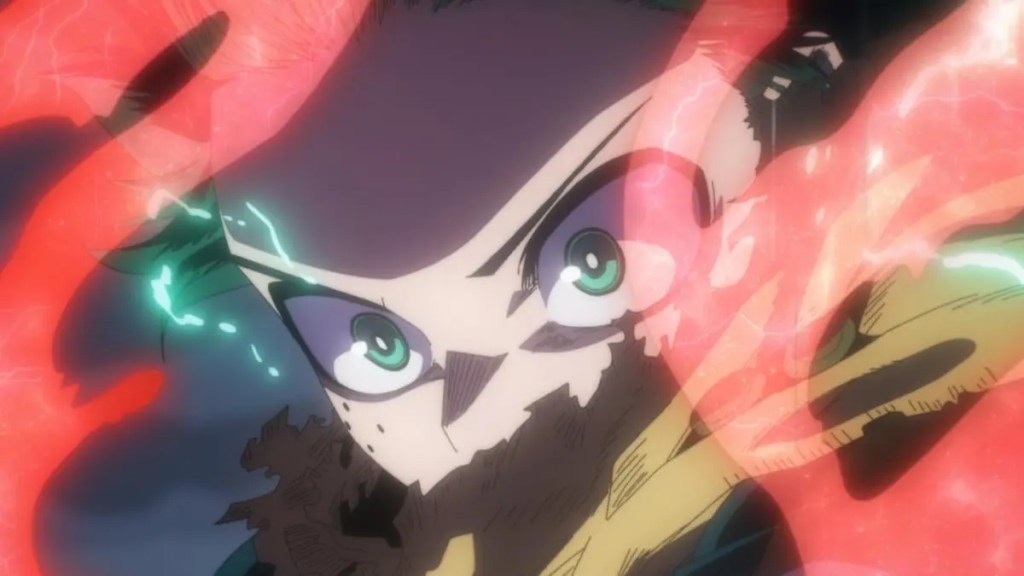
Chapin: Man, I really hope they finally make it to the next grade. It has been a really serious year for all of them. It is my hope that all of the Class 1-A kids get to advance on and then hopefully maybe finally graduate from UA high school. Bold.
Vale: I think it’s important that Shigaraki realized the error of his ways and then go off and start a garden and just live a quiet life in the countryside. [Laughs]
Q: And finally, how do you want My Hero Academia to be looked at and remembered in 10 years time?
Briner: I hope it’s remembered by all the good times and all the connections it brought. The feeling of getting to sit down every week with all of your friends and family and screaming about this new episode and what’s going to happen next and what’ll happen two, three, four years from now in the show. That was really special. To be a part of that moment when it was happening, it’s unlike a lot of what I’ve experienced so far. I just hope that people remember the lessons that we’ve all learned together and the connections that we’ve been able to forge. Some of the bonds I’ve made through My Hero Academia are some of the deepest and most special that I could have ever imagined.
Chapin: I hope it’s remembered fondly. The reality of it is kind of like Justin just said – the friends that I have been fortunate enough to make because of the show from us traveling and going to conventions, it’s been an incredible experience. Those people are like my family, you know, and we all pick on each other and give each other a hard time just like family does. I’ll forever be grateful for it.
My Hero Academia, the anime is not yet done. As far as we know, we don’t necessarily know what’s on the horizon. But as it gets to that point, I’m excited for new people to finally start the series because they no longer feel the weight of having to wait for future seasons and future episodes. I think it’s going to be something that there are the people that have been watching it since day one, and there will be people who are watching it long after it’s done and getting to experience this incredible story along the way.
Vale: I want people to bring their grandkids into this in a few years.
What do you think about My Hero Academia‘s latest season? Are you excited for the anime to come to a close? Give me a shout at @meganwpeters with your take! You can also let us know what you think over on X (Twitter) and Instagram.





